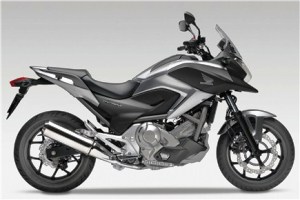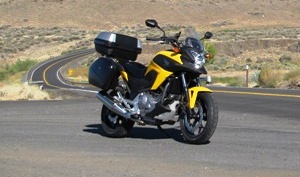Honda NC700X
 Begin
with a great bike, add bling and you’ve got—BLINGO
Begin
with a great bike, add bling and you’ve got—BLINGO
After almost a decade of being asleep on the job, Honda has risen
to the challenge and once again created a multi-purpose motorcycle
that will satisfy long time loyalists as well as new riders.
The NC700X combines simplicity with versatility at a price point no
one can argue. The basic 2012 model, clocking in at just under $7k, is hard pressed to
show you just what it is. Is
it an ultra light sport touring mount, a street standard, a wolf in
sheep’s clothing or a dual sport for the easy-breezy pea gravel set?
Hard to say, but our tests confirm it’s a bit of all that.
For years it’s been obvious that Honda missed the boat entering
the dual sport adventure market in the US. But the fact is, they were
actually there in 1988 when they introduced the NX650 and Transalp
models. However, neither model sold well and Honda closed up shop on the
adventure bike market for the US by 1990. Several years later, BMW
launched the Funduro, aka the F650, and the market got hot fast. In
the early '00s Suzuki introduced the V-Strom. A tad more hefty
than the F650s, but as many riders proved it would serve its
purpose on pavement and gravel. So where was Honda? In 2009 Honda
introduced its European wonder, the Varadaro, to the Canadian market
and got it DOT approved for the US market, but it never saw the
light of day here.
Meanwhile, back in R&D, a design team took the motor used in the
Fit (Honda's current compact car), essentially cut it in half and
developed what would be the first adventure bike from Honda to see
US shores in more than two decades. It’s been a long wait, but the
wait was worth it.
The bike has become a best seller, not only here in the Northwest
but around the world. Within a few weeks after its late July
release, dealers were out of stock on the base model and waiting for
their fall allocations to meet customer demand. It’s been a long
time since Honda has had a best seller like this—especially
in an under 1,000cc class model.
The NC700X features a parallel twin with a long bore, which means
it’s happiest at lower RPMs. The sweet spot is between 3000-5000
rpm. The bike red lines at 6,500 rpm and lets you know when you get
there by intermittently cutting out, abruptly sending the rider a few
inches forward as a result. There’s simply no need to go there. The
10.7:1 compression ratio is a little lower than an inline four,
requiring more use of the brakes when cornering rather than relying
all on compression.
But the transmission and motor make up for these two negatives by
providing a smooth ride, a really nice motor tone and awesome gas
mileage. We averaged 65-67 mpg for the first 2,000 miles.
We like the stock exhaust. It's so quiet you can't hear the
bike on the highway, you can only feel it. When you can hear it,
it's got a sweet large feline purr similar to the old PC800s Honda
produced.
A smart, lighter design features a large single Wave rotor for
the front brake, and a
smaller disc for the rear, resulting in plenty of stopping power.
Suspension on our new model was a bit stiff for starters, but got
comfier once the bike passed the 2,000 mile mark.
Honda doesn’t provide a tool for adjusting the rear Pro-Pink shock
and makes no mention about doing so in the manual, other than
advising you to go see your dealer.
Overall Handling of the bike is awesome. The bike got a spin down
the east side of Mt. St. Helens, a road we know all to well from
putting on our Rally in the Gorge. Oh My! From Randall to Elk Pass
was a dream. The bike made every corner seem easy, even those with
frost heaves. From Elk Pass to Muddy River, the bike showed it's
lack of compression, but using the brakes minimally accomplished
what we were looking for in smooth corner transitioning in and out.
It's just takes a few time to retrain the brain function if you're
used to an inline four.
As with most bikes today, there is no tool kit on board per say,
but you can craft your own out of a CruzTOOLS Road Tech M3 kit. Just
disregard the unneeded items to lighten your load. A full list is
included on the useful NX700X/NC700S forum online
(www.nc700-forum.com).
The look and overall design of the bike is almost futuristic.
You’re not getting has-been technology or old school lines here.
Instead you’re getting a bike that is going to look as good in 10
years as it does today. The functional 22 liter storage compartment
where the gas tank would go makes a lot of sense, and allows for
storage of heavier items like an air pump, tire repair kit or water, to keep the CG of the bike low. Our one gripe—the
2012 model only came in Silver for the US market. More on that in a
moment.
Ergonomics are excellent. The bike was a good fit from the
get-go. With a 30" inseam I was able to get both feet on the ground
comfortably, and maintain a 15% bend in my elbows while holding a
straight up and down perpendicular position while riding. No need
for bar risers. Just what everyone who rides 200 plus miles at a
time wants from a touring motorcycle.
Does it go off-road? The question on every dual sport rider's
mind. Initial Honda advertisements of the bike showed it parked on
pavement with a dirt road behind it. But with Bridgestone BT 023
Sport Touring tires installed from the factory, the bike proved to
be unhappy when ridden down the gravel FS 9712 road from Blewitt
Pass to Liberty near Ellensburg. It seriously needs 80/20 tires if
someone wants to go off-pavement with it.
 Let
the modifications begin
Let
the modifications begin
While the NC700X is a great bike out of the box, there’s plenty
of room for improvement based on a rider's tastes. We went to work on
ours before it even rolled off the showroom floor. Elite riders say that
you should plan to spend as much as you paid for the bike in add-ons
after you buy it. Now—that’s the elite talking. For the more frugal you can cut that price
tag down. But remember, the NC700X is only $7k unless you sprung for
the DCT/ABS version which runs another $2k.
Adding luggage
When we ordered our bike, we went ahead and added a top box
and side cases to the order. After all, you gotta have some space to
store everything, and the Ortlieb bag is getting a little old and
it’s always been cumbersome. Honda worked together with designers at
Givi to create some almost gothic style side cases. The thinking
that went into the actual functionality of the cases is worth
applause as well. They’re easy to attach and un-attach and come with
a tumbler kit so you can key each one to the ignition key—nice. For
some reason, they designed the top box to use its own smaller key. OK, so you still need an extra key. Not a big deal. Other aftermarket
companies are creating racks and cases for the bike, but we think
the Honda/Givi one looks the best and provides plenty of storage
space. Storage capacity of the top and side cases combined with the
storage up front comes to a whopping 124 liters, far more than any
practical touring rider would ever need solo.
If it’s yellow it’s mellow
Every motorcycle is a good motorcycle … as long as it’s yellow,
right? Whatever your color preference is, unless you like
silver you'll need to tear off the body work and take it to the
painter. You’ll be much happier! We had our unit broken down and painted
before we ever took final delivery from the dealer (at which point
the luggage had been mounted as well).
Those tires have gotta go
There’s no way you’re going to want to spend much time on a fire
road with those slippery BT 023 tires. Off ours went to Craigslist,
and on came a set of Avon Distanzia 80/20 Dual Sport tires. The bike
had a revelation indeed and performed much better off-pavement. We
toured it across the CG's (county gravel) along the Nez Perce
reservation in Idaho, then ran it across FS29 in the Olympic
National Forest. The results are what we think Honda might be
looking for in the long run from this bike.
Seat yourself down
Stock seats are for the birds. Seems they don’t fit anybody. Ours
was such that the inner thighs were feeling excessive strain. A trip
to Rich’s Custom Seats in Kingston resolved the issue by providing
better overall support. The leather covering will last far longer
than the stock vinyl.
Needs a center stand
Because the bike requires chain maintenance, it’s not a bad idea
to get the center stand accessory. Ours is on order, but they're hot
so we won't see it until November.
What we didn’t get
To date, more than a half dozen aftermarket manufacturers offer
large wind screens. We tested moving the stock wind screen 1 inch
upward. Bad idea. The bike became unwieldy at 60mph and it was all
we could do to get the wind screen back into its OEM position.
Obviously Honda wind tunneled the bike during design and found this
to be the optimal position. Adding any height will reduce
controllability. Nonetheless, if you must have a larger wind screen,
we suggest you go with Honda’s since they probably put that through
some wind tunnel testing before deciding on the final design.
We didn’t get those funny metal plates you affix to the luggage.
We think they steal from the more stealthy look you get with the
basic black bags.
The last word - If you're looking for a nice bike that functions equally well as
a sport touring
mount or a dual sport on pea gravel, the Honda NC700X is certainly
worth checking out.
SR/Fall 12
The following Pacific Northwest companies provided support in
making the mods happen
